Precious Bodily Fluids
Shakespeare's Worst Italian Plays

Once upon a time, Italy had the most advanced civilization in Europe. During the Renaissance it was common for events there to make their way into literature and, from there, into other countries' literatures. Shakespeare's Romeo and Juliet, for example, was based on an Italian poem and, while he made up certain characters like Mercutio, he had other Italian sources to draw on.
This is one of them. On the evening of 3 July, 1582, in Mantua, a young Scotsman named James Crichton left the house of a woman and stepped into the street and was set upon immediately. Some say that what happened next was just a drunken brawl that got out of hand. Others say that Crichton and his friend drove off their assailants. There are those who say that when the last man removed his mask, he revealed himself as Prince Vincenzo Gonzaga, the 19-year-old son of Crichton’s patron, the Duke of Mantua.
On seeing Vincenzo, Crichton dropped to one knee and, following the codes of courtesy, presented his sword, hilt first, to the Prince. Vincenzo took the sword and ran Crichton through the heart.

Crichton was only 21. Famous throughout Europe for his intelligence, his good looks and his fighting skills, he had challenged the intellectuals of Paris, Genoa, Padua and Venice to debate and defeated them. He had challenged a man who had killed three of the finest swordsmen of Mantua, dispatched him and distributed the prize money among the families of the victims. It was for these reasons Crichton had been invited to stay in Mantua, the city of Virgil, to tutor the Duke's son.
Now he was dead. His body was examined by officials and hurriedly placed in a tarred coffin and buried in the church of Santi Simone e Giuda on the via Domenico Fernelli. (Or so it was said: a few years later, new poems from Crichton turned up in Milan and rumors spread that he had faked his death.) Back in Mantua, Prince Vincenzo apologized to his angry father, but he was exonerated because his sword was judged to have been shorter than Crichton's. Perhaps it had been an accidental stabbing? The Prince went on to become the Duke of Mantua and Monferrato and his court was filled with music, art and beautiful women. Crichton's murder would be forgotten.
Not in Scotland. One of those Scots, the supremely gifted Sir Thomas Urquhart of Cromarty, would claim, more than 70 years later, that Shakespeare had Crichton and the Duke in mind when he created the duel between Romeo, Mercutio and Tybalt. Not only that, he said, when Shakespeare wrote Hamlet, he chose to call the-play-within-the-play "The Murder of Gonzago," as an ironic riposte to Vincenzo Gonzaga. (Verdi would tackle the subject too, in Rigoletto, in which the Duke of Mantua is said to have been based on Vincenzo.)
Urquhart reveals in his book Elixir of Eternal Life (1651) that Shakespeare himself was in Mantua during the so-called "lost years" and that he discovered the truth of Crichton's murder. This is much debated in academia, of course, for we know that travel to Europe was effectively banned at the time, but Urquhart puts to an end all those old wives' tales about how other people really wrote Shakespeare. If it were true, he says, why didn't someone expose it earlier? Urquhart goes on to reveal how Shakespeare revised his plays constantly. Indeed, Shakespeare was writing ur-ly versions of Romeo and Juliet, Macbeth, Hamlet and Othello in the late 1580's and this was well known in Italy during the decade that followed. It did not make Shakespeare popular with the Italians and so they ignored him.
This then is the story of Shakespeare's worst Italian plays.
Romeo and Juliet: the Shakespeare version
Romeo and Juliet is, above all, a work of anti-Italian propaganda, written to belittle the royal family of Mantua and the role of the Code Duello in Italian society. It is by an Englishman who appears never to have used his own sword, even in anger. We know from agents in London that the man has a sword. Why has he never used it? Scholars, of course, seem to think that duels are beneath them, believing that men who wear rapiers should be afraid of goosequills. This is an amusing folly that Shakespeare embraced, whereas gentlemen like Edward de Vere (and even Ben Jonson) did not.
Consider how the play unfolds. At the beginning, Shakespeare stages a common street brawl and follows this up with Mercutio ridiculing duels as the idle activities of young hotheads - “The pox of such antic, lisping, affecting fantasticoes.” Clearly these young men do not follow the Code and whether Shakespeare understands this is unclear. Why though does he have Mercutio contradict himself and draw his sword on Tybalt, the hero of the play? Mercutio provokes this fight. Why is the Code mocked in this way?
Cast of players here.
Mercutio is stabbed under Romeo’s arm in what apparently is designed to be an accident, as if we can blame the stars, or the Pope, or God. As if that were not enough, Tybalt himself is killed immediately afterwards. What is Shakespeare asking us to believe here? That Mercutio is a hypocrite or that he simply lost his mind, in some Queen Mab flight of fancy?
More likely that Shakespeare thinks the Code Duello and dueling are the wrong way to resolve conflicts and that they are sign of Italian decadence. However, while duels are still illegal, they are necessary. We live in a world of street fights and family feuds, in a world of faithless women, and men without honor, a world of feigned anger and frivolous challenges tossed out at the drop of a hat. Duels are still the best means of resolving personal conflicts and they foster a sense of responsibility. Who among us wants to go back to the days when you had to hire some gangland thugs to do the dirty work of enforcing justice?
We do not believe Shakespeare ever visited Italy, and yet he thinks it amusing to accuse the great Italian families of petty dynastic quarrels, bad marriages, poisonings, corruption, impotence and the like. He is a fine one to talk. The truth is that the English indulge in these vices, and probably worse. The Spanish Tragedy is another such work, insulting Spanish honor.
A commoner like Shakespeare could never grasp what is at stake simply from reading Il Cortegiano or Gerusalemme liberata or listening to Crollalanza's sexual fables in the tavern. Perhaps it is envy, or perhaps it is ignorance. Either way, as the Duke might well say of Shakespeare, "If I do see thee here in Italy, I will murder thee too."

Romeo and Juliet: the Italian version
According to Duke Vincenzo, the young Scotsman in Mantua over-stepped his mark because she was not his woman to have and, like Mercutio, he foolishly provoked a fight. In not following the Code, Crichton was stabbed accidentally in a common street brawl that was all a misunderstanding. A '"pure misadventure" the Duke would call it.
Context is important here. The year before, in April 1581, Prince Vincenzo married the Princess of Parma, Margarita Farnese. Unfortunately, their marriage remained childless. Margarita was unable to perform her duties because of a tragic deformity of the hymen and Prince Vincenzo, understandably, began to consider an annulment. In May 1583, the marriage was annulled formally on grounds of non-consummation, with the Princess accusing Vincenzo of impotence. But it is very revealing that she ended up in a nunnery.
Vincenzo now planned to marry Eleonora di Francesco de' Medici, from Florence, his cousin and a more suitable match. There was a slight delay while her family insisted he be put through various tests to prove his virility. The tests were thorough. The first involved performing with an orphan girl in the presence of eight women and a set of guards, priests and agents. Surprisingly, Vincenzo couldn't concentrate, or perhaps she was ugly, so the Medicis agreed to a second test, with another orphan girl. This time Vincenzo was successful, perhaps because all the witnesses but one were behind screens. The exception was a doctor who had to examine Vincenzo during the act to confirm the erection and penetration. The Medicis were fully satisfied when the results came in and the royal couple married in April 1584 and they had many children. In 1608 he created a new Order of Knights of the Most Precious Blood and the same year he financed an expedition to the New World to seek out powerful aphrodisiacs to enhance natural virility. What else is man's fate but to transform himself from beast into transcendent erotic being? Vincenzo also led three campaigns against the infidel Turks in Hungary. This is a man of honor.

Hamlet: the Shakespeare version
There are bodies everywhere by the end of Hamlet, piled on stage like a plague cart. Laertes' poisoned sword and a goblet are used to dispatch the remaining cast. Before the bodies are removed and the ordinance shot off, we can imagine the tolling of the bell and red crosses on the doors and street fires choking the air inside the theater. It is as if Hamlet were staged in a Plague Village, or during the Saint Bartholomew's Day Massacre, or in Hell frozen over.
This play is, they say, about murder and revenge. The groundlings embrace the bloody spectacle and the clowns, if only to take a break from the bear-baiting and the whorehouses. For the rest of us, Hamlet is about poison - the shadow of the plague which has infected everything. Qu'il ne faut pas juger de nostre heur, qu'apres la mort.

Hamlet is a winter's tale of secrets and ghosts, Macbeth without so much blood, Romeo and Juliet without the sun. Verona in summer lies stinking under a dark blanket and there is a quarantine in Mantua that leads to Romeo's suicide. Choler - yellow bile - is the dominant humor of the play. In Hamlet, though, it is black bile - the plague erupts even into the speeches: "If thou dost marry, I'll give thee this plague for thy dowry" and Hamlet gives it to Ophelia in lines like rapier thrusts. She is soon dead. Others follow.
To what purpose? For Shakespeare the plague, like poison, is not just a metaphor for lovesickness, but for the flattery, lies and deceit that pass for conversation among the rich and powerful. Drink up the monarch's plague... Something is indeed rotten in Elsinore. Nous veillons dormants et veillants dormons. Indeed, did Hamlet, the "ambassador of death" bring the plague with him from Wittenberg, or was it there already? Was that the poison that killed his father? ("There is a sickness/Which puts some of us in distemper... and it is caught/Of you that yet are well.") Hamlet is cornered by "chimeras and fantastic monstrosities" at every turn. He struggles to escape them but Death finds him anyway, for his Creator has conspired against him.

With Hamlet, Shakespeare murders his own hero. Worse, he takes down the entire play along with him and expects the audience to participate. When Hamlet rages at us in speeches that are all out of joint with events, it is as if Shakespeare has no other goal than to go beyond all the previous Hamlets, beyond all the other overwrought Elizabethan revenge tragedies, by piling upon the story all those lofty wind towers. The result is so top-heavy it falls over. Now everyone wants to prop it up again by offering their own theory about Hamlet's character. The play is, as they say, the Mona Lisa of literature and just as maddening. If there is some catharsis here, it is Shakespeare's own, not ours.
There are ways to survive a plague, at least for the rich, not the least of which would be to stay away from Elsinore. Hamlet returns not once but twice.
Hamlet: the French-Italian version
Montaigne never visited England. If he had done so, and seen an early version of Hamlet at Bankside, it seems unlikely he would have admired it. He may have found it an exercise in sadistic cruelty. It was not Montaigne's way to give in to disgust: "I will follow the good side right to the fire, but not into it if I can help it," he once wrote.
It also seems likely he would have viewed the story through recent events in France - the coup d'état by, and then murder of, the Duc de Guise in 1588 by the guardsmen of King Henri III, and the subsequent murder of the King himself the following year. Indeed, pretty much everyone is dead at the end of both stories.
Montaigne's Hamlet is, we might say, a Medici murder mystery, both French and Italian, but not Danish or English, for France at the time was "ravaged by disease, famine, and public disorder. No wonder young nobles of (Montaigne's) generation ended up as exquisitely educated misanthropes," to quote Montaigne biographer Sarah Bakewell.
The cast of players in Paris (the "Three Henri's") is here.
Several Popes set the tone by sanctioning regicide. This primarily was directed at Elizabeth I, and she retaliated with her own assassins. The Italian influence extended to family dynasties arrayed across Europe. In France, Henri, the Duc de Guise was the son of Anna d'Este of Ferrara (and nephew of Duke Alfonso II). King Henri III was the son of Catherine de' Medici, the most powerful woman in Europe for much of the 16th century. Henri of Navarre (the "third" Henri, who succeeded him) would marry Marie de' Medici.
Montaigne was drawn into these events against his will, arrested and released. There are similarities between Montaigne and Shakespeare in how they avoided such politics. Montaigne: "There is some consolation in dodging, one after another, the successive evils which have us in their sights, only to strike elsewhere around us." He also asks "whether it is lawful for a subject to rebel and take arms against his prince..." It is Hamlet who asks, for Shakespeare: "whether 'tis nobler in the mind to suffer/The Slings and Arrows of outrageous Fortune,/Or to take Arms against a Sea of troubles..."
To act or not to act. Montaigne mostly chose to defend moderation and human limitations and the virtues of mediocrity - "I propose a life ordinary and without lustre," he wrote. He meant it. He tried to put it into practice when he retired in 1570 ("I abstain") at the age of 37. It was like Rosalind in the Forest of Arden, except that for Montaigne, exile was in a vast mansion on the Dordogne River. But it was not for long: the St. Bartholomew's Day Massacres raged across France and found their way to his door. By the 1580's, when he was already famous, he was even less able to "dodge" religious conflicts. This is consistent too with Shakespeare, who became a celebrity in Elizabethan London, but who shunned controversy and the limelight, which is, perhaps, the reason we know so little about him today.
Montaigne was unable to evade the plague when it overran the Bordeaux area in 1586-87, brought in by invading armies. To flee or not to flee. To stay would have meant death and to leave meant abandoning the peasants to their fates. He had seen people dig their own graves and lie down to die in them, so he chose to take his family on the road for six months. He was 53 - already a year older than Shakespeare when the Englishman died. A third to a half of the population around Bordeaux died while he was away.

Death, for all the dreams of the alchemists, could not be dodged, and Montaigne gave much thought to knowing how to live well despite it. Only he could have written a line like, "Je veux que la mort me trouve plantant mes choux." This mix of melancholic and sanguine humor remained with him all his life, even as his kidney stones were driving him to distraction. His best essays come from this time, notably his witty and frank digressions about sex, marriage, impotence, dildoes and other fancies (here).
When the end came, in 1592 at the age of 59, it was quinsy that killed him, a complication of tonsillitis and a particularly horrible way to die. This time he must have felt more like Hamlet, trapped in his mad creator's sadistic tragedy.

Othello: the Shakespeare version
That Shakespeare could write a terrible play like Othello, in which we are asked to trust him that Desdemona is an innocent victim, flies in the face of all we know about women, for why should we believe that women are to be trusted any more than men?
Shakespeare's source material was Cinthio, who worked for the Este dukes of Ferrara and usually we are drawn to Italian stories because there is no end to the villainy and deceit. In Cinthio, however, we have a very poor guide. Remember, in Hamlet, Macbeth, King Lear, Measure for Measure, Twelfth Night and All's Well that Ends Well, and perhaps Arden of Faversham, if he wrote it, Shakespeare appears to understand why women can never be trusted. They are just as likely to be fishing in their neighbor's pond as the men. Indeed, they have been known to murder them as well.
Worse, Shakespeare has chosen to present Othello from Desdemona’s point of view, a strange exercise to say the least, because we know she has not been, nor could she ever be, faithful to Othello. You will recall Iago saying: “Come on, come on. You are… devils being offended,/Players in your housewifery, and hussies in your beds”? Iago is a comic figure of course, the fool who speaks the truth to Lear, a Sancho Panza to Othello’s Knight. Desdemona, too, knows perfectly well that Othello can "tenderly be led by the nose/As asses are." Unfortunately, Shakespeare would do the same for us by dangling a pretty face before us and leading us by the nose to the slaughter that follows.
Such a virtuous woman as Desdemona never could exist, of course, except in the febrile imaginations of a Dante or a Tasso, a King Lear or a Don Quixote. In Othello, 'tis true she is not a whore like Bianca, but there are signs Desdemona takes drugs and that she soon will tire of Othello. Even her own father Brabantio warns Othello that she is "So opposite to marriage that she shunned the wealthy curled darlings of our nation" and later he warns him "Look to her, Moor, if thou hast eyes to see. She has deceived her father, and may thee." Iago has it right when he says (to Roderigo), "When she is sated with his body, she will find the error of her choice: she must have change, she must." Indeed it is because Othello realizes this that he calls her an “ill-starred wench” and other names.
Shakespeare, of course, woefully tries to conceal the truth. She is the very picture of innocence, which she insists on constantly, a sure sign that she is being sluiced by someone else. Othello knows he cannot trust her - the "forked plague" of her infidelity and his cuckoldry. When the "lost" handkerchief saga turns into a bloody farce, "the raven o’er the infected house,” we have sat through this plague to what end? To curse other men?

Othello: the Italian version
If Shakespeare really had wished to write an Italian tale of jealousy and murder, he would have been better advised to write up the celebrity murder that gripped Naples in 1590. Carlo Gesualdo, Prince of Venosa and celebrated musician, murdered his beautiful wife Donna Maria d’Avalos and her handsome lover, the Duke of Andria, when he caught them in flagrante delicto.
It appears the Prince was forced to act once rumors of her infidelity had become widely known. Being an artist, he stage managed the execution, pretending to be away on a hunting trip, before returning (stage right) to find the lovers sleeping in bed, whereupon he murdered them both.

Now it may be that the rumors of his wife’s infidelity were spread by a treacherous family member, and it may be that the Duke of Andria was married with four children, and it may be that the Prince stabbed Donna Maria multiple times, shouting as he did it, "She's not dead yet!" and it may be that the body of the Duke was found dressed, oddly enough, in Maria's night dress. The depositions survive to this day and they agree that there was blood all over the place. The murders were the sensation of Naples for months and they were celebrated by many, including the great Torquato Tasso.
Now, perhaps the Prince did not murder them himself? Perhaps he left it to his assassins to plunge in the daggers and leave a trail of torn bodies and bloodied sheets. Perhaps he just had his servants do it? Can a man blinded by jealousy and rage stand aloof? Lovers and madmen have seething brains. The legend says that afterwards he arranged for the bodies of the lovers to be displayed for the public to see, in front of the Palazzo Sangro di Sansevero as if to say, the honor of the Prince of Venosa is now redeemed. He then fled to his castle of Gesualdo in Avellino, which is understandable because Donna Maria’s ghost was spotted in the old palace and outside in San Domenico Maggiore, muttering "The candles are all out…. it will be rain tonight.”

This is, then, the tale of a man driven to murder his wife in a fit of jealous rage. It turns out, though, that they were cousins, and she was six years older than him, and this was a dynastic marriage to produce an heir. If they failed at that, their estates would fall into the hands of the Papacy. When she did produce a son, she considered her work over. "Moro, lasso, al mio duolo,/E chi può darmi vita,/Ahi, che m'ancide e non vuol darmi aita!" He learned to take his pleasure elsewhere, some said with young men, others said with music and chronic constipation.
He was never prosecuted, though, but he did penance with an occasional whipping. Years later, he remarried (another joyless marriage of spousal abuse) and they had more children, but he re-dedicated himself completely to his music. He died in 1613 – the same year as Cervantes and Shakespeare - probably a suicide, after his son by Donna Maria died in a horse-riding accident. The Prince was only 47. His body is interred in the Church of Gesù Nuovo in Naples. Or at least it is supposed to be; the body may never have been moved from his castle town...

Othello: the Spanish version
How then should one tell of a wife's murder? Cinthio's story is a lurid pot-boiler in which "the Moor" and "the ensign" together bludgeon an innocent “Disdemona” to death, smash her skull and cover up the murder. It wasn't much for Shakespeare to work with. He improved the story, no doubt, but he gave the villains Spanish names and backgrounds, as if everyone is a Morisco refugee - Othello, Iago, Roderigo. It's an insult to Spanish honor just like that dreadful The Spanish Tragedy.
Miguel de Cervantes never engaged in such sadistic storytelling, despite what Nabokov had to say about it. Perhaps it was because Cervantes had fought a duel himself as a young man and been forced to flee to Rome, and because he lost the use of an arm at Lepanto. Wisely, he preferred a comic approach, to tell the stories of regular people, rather than the nobility, the dreams of dreamers and how everyone else must deal with this, all the while keeping an eye out for Church inquisitors. Sexual jealousy is one of his preferred themes - for example in El Celoso extremeño (The Jealous Old Man from Extremadura) in Exemplary Novels; the play The Labyrinth of Love, and his famous tale El Curioso Impertinente in Don Quixote (here). Cervantes mocks those who cannot trust their lovers, or those who cannot forgive their spouses, or those who do not spend any time with them. He understood all this, having lived it for himself, and perhaps he might say that Spanish husbands do not kill their wives any more than other men do. They get jealous but they take their wives to court like other men do, or their wives take them to court as other wives do, or the men learn to live with their wives. Sometimes they discover it is much better that way.

Cervantes’ own marriage to Catalina de Salazar y Palacios (above) in 1584 lasted the rest of his life. While Cervantes himself was in and out of prison and embroiled in lawsuits, none of them were filed by Catalina herself or her family. When he married her, she was 19 and he was 37 and a war hero. The biographies are scathing. The marriage was a mismatch for the first two decades – he was rarely home in Esquivias and this appears to have been as much by choice as by financial necessity. They never had children. Was that by choice? Was she unfaithful? It is unlikely. In 1590, Catalina joined the Order of the Most Holy Sacrament, really a vow of chastity, and she received the habit of Secular Franciscan Tertiary in 1609. Even in later years, her relationship with her husband was much like that of a widow. When they were reconciled, they do not appear to have been emotionally close, but who can say? The biographers do not know.
Cervantes himself may have been faithful when he traveled. There was that affair with the actress Ana Franca de Rojas in Madrid that produced his daughter, Isabel de Saavedra. She was born the year Cervantes was married and we know of no infidelities after that. Isabel herself careens through the Cervantes biographies as a woman who used sex to get ahead in hard times. Could she be trusted? Not at all - by the time they were in Valladolid, the Cervantes women had something of a reputation.
Cervantes himself may have been celibate, which has given rise to theories of impotence and homosexuality, none of which are very persuasive. He was old school, a man of honor, who became a Secular Franciscan Tertiary in the weeks before he died. He understood why men make fools of themselves over women and why women might just take advantage of that.

King Lear: the Shakespeare version
It is difficult to care much about the fate of Hamlet or Orphelia or Lear or Othello or even Desdemona, but Cordelia is another matter.
She dies in her father's arms, the truth-teller murdered off-stage on Edmund's orders. Lear's words "A plague upon you, murderers, traitors all!" recalls the moment in Romeo and Juliet when everything begins to unravel. But this is Lear's story, not Cordelia's. The spirit of hope she represents is shunted aside in the interests of the Machiavellian villains and the apparent need to revel in the horrors of what happens in a time of civil war. Jerusalem Delivered this is not. Even when some voices speak up - like Lear himself - "that way madness lies; let me shun that; No more of that..." - it is far too late. Madness is where he is headed anyway and most of these characters end up dead. There is no redemption, such as we might find in As You Like It and Measure for Measure and Shakespeare's last great plays The Winter's Tale, Cymbeline and The Tempest. Instead, the world of King Lear is a fallen one. We are locked up inside Torquato Tasso's insane asylum.

King Lear: the Italian version
The Italian King Lear spent his last years raging from city to city - Mantua, Rome, Naples, Florence - and then back to Rome at the end. When he died in the convent of Sant'Onofrio in Trastevere in April 1595, he was only 51, one year short of Shakespeare.
Torquato Tasso's Gerusalemme liberata was published in 1580, at which time Montaigne visited the melancholy madman in Ferrara, in the Ospedale di Sant'Anna. Tasso, the lunatic, the lover and the poet, who saved his heroes in Gerusalemme liberata but who could not save himself. Montaigne left very much unimpressed with the younger man. He would write of how "countless minds have been ruined" in the same way as Tasso, overreaching in the realms of religious and poetic ecstasy and the supernatural. Was he mad by this time or just eccentric? Did he see ghosts like the martyred Hamlet? Was he a devout Catholic to the end? Was he still resentful at his patron the Duke Alfonso II or at Leonora d'Este? Was he in love with her or was that just for show and he preferred dalliances with boys? He was another Mona Lisa of literature. Interestingly, he had an older sister named Cordelia (Shakespeare's own Cordelia resembles one of those strong Medici or Este or Gonzaga women).
Claudio Monteverdi surely encountered Tasso in Mantua, since he started working there around 1590 and perhaps he would have prescribed music to heal the sick man's soul. That was how Monteverdi saw his vocation. It was not a new idea - Marsilio Ficino had translated what he took to be the original songs of Orpheus in the belief that music could heal the sick. Could it put us in harmony with nature, with the music of the spheres, with God? Could it make us forget? Tasso was always in a state of decay, with skirmishes fought across body and mind on a daily basis. He could never forget that he stood behind a dam that barely kept the rotting at bay. Monteverdi's music made it possible to forget all this.

It is a paradox though. Monteverdi married a singer Claudia Cattaneo in 1599 (here) and they had several children together. Everything seemed to come together in February of 1607, when L'Orfee was performed in the Mantua carnival. In this earliest of operas, which tells the story of Orpheus and Eurydice, a castrato performed the role of Proserpine and possibly other parts, which gave the opera an otherworldly sound. Orpheus crosses the Styx and enters the kingdom of the dead, the kingdom of words, and he banishes the shadows with song. But on his way out he forgets and drops back into time, making his famous mistake, looking back to see if Eurydice is following him. He loses her. In consolation, he is taken up into the sky where he can gaze upon her forever, a celebration of immortality through God's forgiveness.
L'Orfee is about love and loss and the power of music to heal the human spirit when words fail. Because words on a page create only ghosts, shadows that we constantly chase after, songs on the other hand create something that allows us to forget time. Songs encourage the idea of cheating death for a while.
But Claudia died in September of that year. The family had always struggled to get by in Mantua. Monteverdi never remarried.
How to deal with grief, how to express it in music? There is no redemption in the melancholy madness of a Shakespearean tragedy like King Lear, in which music is mostly absent. Such art is profane. Without redemption, God does not exist. Monteverdi, however, still believed in redemption. A few years later, while he was still in Mantua, he composed one of his best works, Vespers (or Vespro della Beata Vergine), which was published in Venice in 1610. This is the kind of music which if heard in a beautiful place of worship reconnects you with God. Even today, there are many who attend church and find God only in the harmonies, not in the prayers, not in the icons, not in the sermon and not even in the architecture.
In 1613, his contract over, Monteverdi moved to Venice to become the highly respected conductor at San Marco Basilica, where he remained until his death in 1643. During those years in the cosmopolitan city he was very successful and he was well paid for it. He continued to compose, including his tribute to Tasso, Il combattimento di Tancredi e Clorinda in 1624 (he seems to have enjoyed composing secular operas more than religious music); he encouraged his sons in their careers; he survived an Austrian invasion in 1630 that destroyed 12 of his opera scores and a plague epidemic in 1631; and he became a priest in 1632. During these years, Venice's aristocratic families built the first ornate theaters as we know them today, for their own private pleasures, of course, and the first of the great public opera houses opened in 1637.
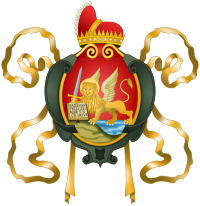
Music has always been able to, if not exactly bring back the dead, then it can cross into the land of the dead. In pre-Christian times, it was well accepted that the oral traditions of the people - including music, songs especially - evoked the secret language of the winds. Listeners shaped characters and events in the wind, using their own imaginations, fostering a sense of magic and mystery and collective belonging. The music and songs remained at the level of dreams and other intangibles, however. With the arrival of the written word and the rapid spread of painting and sculpture, we have diminished the realm of the intangible and rendered it physical and manifest. What we once dreamed of, now we have lost. In Monteverdi's thinking it is part of our Fall, our flight from Eden. Yet we do have one thing left - the spirit of music which, like the spirit of hope, was the last gift to leave Pandora's Box.
